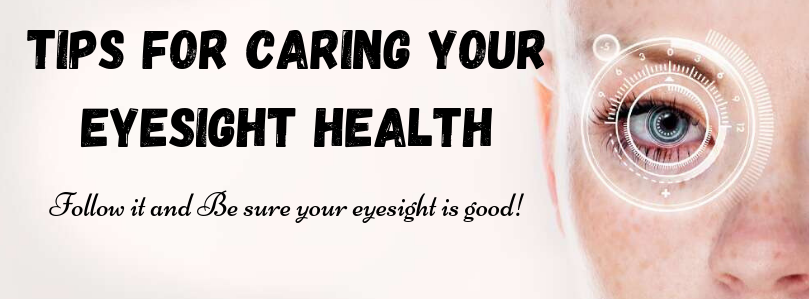Tips for Eye Health and Maintaining Good Eyesight
Warm up for the eyes
If you spend a lot of time in front of the computer, you probably noticed that already in the middle of the working day you suffer from fatigue and dry eyes. After all, we blink twice less often looking at the monitor. The monitor should be slightly below eye level, at a distance of approximately 60 cm. Use an anti-reflective coating to prevent the light from the screen bringing damage to your eyes. Make exercises for the eyes every 20 minutes. Within 20 seconds, look at the object, located at a distance of about 6 meters from the computer.
Always wear sunglasses
Ultraviolet radiation is harmful not only to the skin but also to the eyes. It can cause cataracts, burns of the cornea, and even eyelid cancer. You need to wear sunglasses or special lenses with a UV filter to protect your eyes from the harmful effects of ultraviolet radiation. Do not forget to wear glasses, even on a cloudy day, since snow, water, sand and asphalt reflect ultraviolet rays.
Use protective glasses
Eye injury can be obtained not only at work but also at home if the safety rules are not followed. Use eyeglasses to protect your eyes from small particles or chemicals. You should also choose protective glasses for sports, such as swimming, skiing or basketball. They will help prevent eye damage. The lenses must be made of polycarbonate. Compared to other materials, polycarbonate has 10 times higher impact resistance.
Use foods good for the heart and eyes
Products that improve blood circulation will provide you with a healthy heart and good eyesight. These include citrus fruits, herbs, and cereals. Foods that are high in zinc can help prevent damage from ultraviolet radiation: beans, peas, nuts, oysters, lean red meat or poultry. Beta carotene contained in carrots and other yellow and orange products is very useful for eyesight health. In our bodies, beta-carotene is processed into vitamin A, the lack of which can lead to vision problems. Lutein and zeaxanthin are substances that are also good for the eyes. They are found in greens, spinach, cabbage, and other leafy vegetables.
Do not ignore eye pain
A cold compress, antihistamines or eye drops will help relieve redness and itching. If you feel as if sand has gotten into your eyes, rinse your eyes with cold water or isotonic solution. If the symptoms do not disappear, the eyes are swollen, sore or become sensitive to light, it is better not to self-medicate and seek medical help.
Properly care for contact lenses
Be sure to wash your hands before touching the lenses. After removing the lenses you need to disinfect them. Use only high-quality solutions for this purpose. Change contact lenses regularly, depending on their specified lifespan. Do not wear lenses if you intend to swim in a pool or open water, or use any potent chemicals. Be sure to remove the lenses before bedtime.
Keep track of your overall health
Various diseases that are not associated with vision can cause eye damage. For example, high blood pressure or diabetes mellitus results in a decrease in the blood flow to the eyes. Immune system disorders also negatively affect vision. Therefore, it is worth especially carefully monitor the health of the eyes, if you have any serious disease.
Carefully read the instructions for the use of drugs
Some drug interactions can cause vision problems. Before taking the drug, get acquainted with the possible side effects. See your doctor if you notice symptoms such as dry eyes, tearing, double vision, photosensitivity, blurred vision, or swelling of the eyes after taking the medication.
Do not use old makeup
Bacteria quickly appear in liquid and cream eye makeup products that can harm the eyes. It is necessary to use open means within 3 months only. Do not use cosmetics that have expired. Before putting makeup and after removing it is necessary to thoroughly clean the face from dirt. Do not use someone else’s makeup and testers’ mascara or shadows. If you are prone to allergic reactions, use only proven products that are suitable for you.
Check your eyesight regularly
This should be done, even if you do not wear glasses. Between the ages of 18 and 60, it is recommended that you should check your eyesight every two years. If you are older than this age, wear contact lenses, suffer from diabetes, high blood pressure or some older relatives have vision problems, you should check your eyesight every year.
Stop smoking
Smoking affects the state of the whole organism, including eye health. Smoking increases the risk of cataracts, dry eyes and other diseases in which the retina is affected. Smoking also causes blood clots in the circulatory system and spasms of the arteries. This can lead not only to a heart attack but also cause loss of vision. The faster you quit smoking, the less will be the risk of complications.
Category: Health Care
Tags: eye care, eye drops, human health


 Deutsch
Deutsch Français
Français Italiano
Italiano Español
Español Svenska
Svenska Português
Português 日本人
日本人 Dansk
Dansk Norsk
Norsk Suomi
Suomi Czech
Czech




